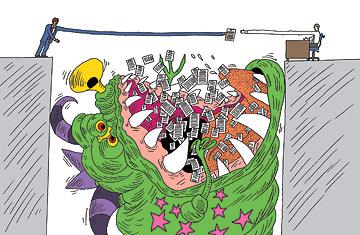
The New Online Job Hunt.
With the economy still floundering and unemployment stubbornly high, job hunting has become a second career for many people. And it's no surprise that in a number of fields, particularly for entry-level positions, the search for a new job is being conducted almost exclusively online. Collectively, the most popular employment sites, like Monster and CareerBuilder, now list 5.2 million openings in the U.S. and close to 1 million in the U.K., according to job search engine Simply Hired. Some 88% of entry-level positions in the U.S. are now listed only online, says college-placement firm Experience.com The promise of job sites is easy to see: a cheaper, faster and more efficient way to connect employers and potential employees. But their very success has spawned a host of problems and new competitors poised to fix them.
The key issue is that job boards are neither as cheap nor as efficient as they once were, Wharton workplace expert Peter Cappelli says. This is in part because of the explosion of users: companies are receiving too many résumés to process, and users sense (not incorrectly, many times) that their applications are ending up in a black hole. Consider the experience of Bill Feeser, a New York City civil engineer who has sent "over a thousand" applications in the past year for jobs in central Pennsylvania as a construction director or real estate asset manager. Response rate? Less than 5%. "If I heard I'd been passed over," he says, "I'd be happy to know that."
Feeser's plight is mirrored for employers that still rely on online job boards. Forced to downsize their recruiting staffs in recent years, many employers can't keep up with the flood of applications coughed up by sorting programs. And replacing humans with software to sift applicants, even initially, has serious downsides. "Simple screens don't work as well with 10,000 candidates as they do with 100," says Cappelli. Rigid sorting systems, he says, can yield irrelevant results that waste time and money. Not only that: less-qualified candidates can game the system by loading their résumés with the right keywords. And, Cappelli adds, such online chop shops remove the human interactions (remember actual job interviews?) that can signal a good fit.
Of course, there are plenty of Silicon Valley entrepreneurs who believe the solution to the lack of a human touch is to be found in--what else?--better technology. A host of new job-search start-ups are trying to move beyond traditional employment boards to create better-targeted matching systems, out-programming the gamers, leveraging social-networking trends and (hopefully) preventing applicants like Feeser from feeling like just a number.
